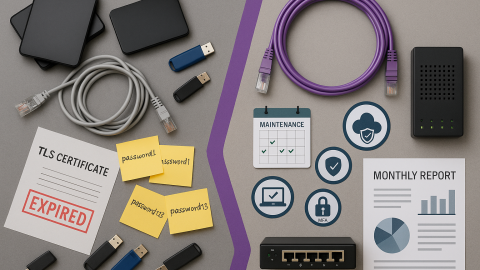Introduction
Ask your staff to list the most annoying part of signing in each morning and you will hear the same chorus: “I need yet another password,” quickly followed by “and that text message code never arrives on time.” For years we have tried to tame password fatigue with complexity rules, rotation reminders, and—when breaches spike—mandatory password resets. Meanwhile, attackers moved on to phishing kits that copy entire login pages, SIM-swap services that hijack SMS codes, and reverse-proxy bots that steal session cookies in real time. The result is a cat-and-mouse game that small and mid-sized businesses rarely win.
Passkeys, an emerging standard built on FIDO2 and WebAuthn, offer the first truly consumer-friendly alternative: no passwords to remember, no six-digit codes to type, and phishing resistance baked into the protocol. Apple, Google, and Microsoft now ship passkey support in every major platform, meaning the technology your staff needs is already in their pocket. The question is no longer if passkeys will replace passwords, but how quickly your organisation can capture the security and productivity gains.
Why Passwords and SMS-Based MFA Are Losing the Fight
Traditional passwords are vulnerable because they rely on human memory and static secrets. Even multi-factor authentication that uses one-time SMS codes falls short. SIM-swap fraud, real-time phishing proxies, and malware that reads clipboard data can bypass these codes before a user realises anything is amiss. Worse, text messages travel unencrypted across the phone network, making them susceptible to interception. In short, the first and second factors most SMBs depend on are showing their age.
Passkeys Explained in Plain English
A passkey replaces the shared secret of a password with a pair of cryptographic keys. When an employee registers on a site or application, the device creates a unique public–private key pair. The public key lives on the service’s server; the private key never leaves the user’s phone or laptop and is protected by the device’s biometric sensor or PIN. When the user logs in, the service sends a challenge that can only be answered by the private key, effectively proving identity without revealing anything to steal. Phishing pages fail because they cannot generate a valid challenge for a key they have never seen and cannot access.
Business Benefits Beyond Security
- Lower support costs: Gartner estimates 30–50 percent of help-desk tickets still involve password resets. Passkeys remove that burden entirely.
- Faster sign-ins: Staff authenticate with Face ID, fingerprint, or a short device PIN, shaving seconds off every login and minutes off every day.
- Happier customers: If you operate a customer portal, offering passkeys eliminates the “forgot password” churn that drives call-centre volume and abandoned carts.
- Insurance perks: Several cyber-insurance carriers now treat passkeys as a compensating control; early adopters have negotiated premium discounts or higher ransomware sub-limits.
A Realistic Migration Roadmap for SMBs
Switching from passwords to passkeys is evolutionary, not a flash-cut. Most organisations start with cloud apps that already support WebAuthn—Microsoft 365, Google Workspace, and most modern SaaS platforms—then roll out passkeys to line-of-business sites via single sign-on. The pilot group is usually executives or the IT team, followed by frequent travellers who rely on mobile devices. Gradual adoption lets you gather feedback, fine-tune device-enrolment policies, and document recovery procedures before opening the gates company-wide.
Hidden Hurdles to Plan Around
Legacy applications that live on-prem or require older browsers do not understand passkeys. Those systems may need a shim, such as an identity proxy that translates passkey authentication into Kerberos or LDAP credentials. Device management is another consideration: a stolen laptop holding a private key is useless if the thief cannot bypass the biometric check, but you still need an endpoint-wipe policy to revoke keys and tokens when hardware is lost. Finally, recovery workflows matter. If an employee’s phone is destroyed, your help-desk must issue a new passkey quickly without re-introducing passwords as a back-door.
Conclusion
Passwords have been the weakest link in corporate security for decades, and layered defences have only delayed the inevitable breach. Passkeys close that gap with cryptographic proof that cannot be phished, reused, or sniffed in transit—while making daily sign-ins faster and easier for everyone. Early movers will spend less time resetting credentials, pay less for cyber-insurance, and slip one step ahead of attackers who still rely on tired password tricks. If you are ready to leave the password era behind, Affant can chart the course and handle the heavy lifting, letting your team enjoy stronger security without extra clicks.
—Affant Security Team











